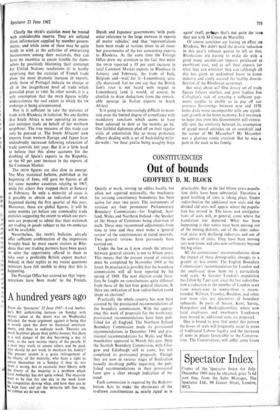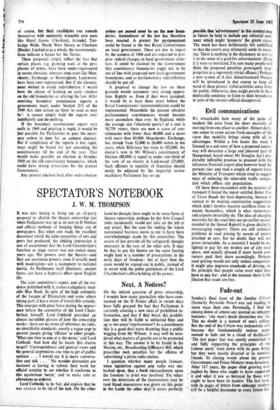Out of bounds
CONSTITUENCIES • GEOFFREY D. M. BLOCK
Quietly at work, stirring up eddies locally, but often not reported nationally, the machinery for revising constituency boundaries has been active for over two years. The instruments of revision are four permanent Parliamentary Boundary Commissions—for England, Scot- land, Wales and Northern Ireland—the Speaker of the House of Commons being chairman of each. These may recommend adjustments from time to time and they must make a 'general review' of the constituencies at stated intervals. Two general reviews have previously been carried out.
Under the law as it now stands the interval between general reviews is ten to fifteen years.
This means that the present round of revision must be completed by November 1969 at the latest. In practice it is possible that the boundary commissions will all have reported by the spring of 1969. The next election could there- fore be fought on constituencies quite different from those of the last four general elections. Is there any indication of how redistribution could shape an election?
Practically the whole country has now been covered by the provisional recommendations of the boundary commissions. With the appear- ance this week of proposals for the north-east, provisional recommendations have been pub- lished for all England. The Northern Ireland Boundary Commission made its provisional recommendations in December 1966 and pro- visional recommendations for Wales and Mon- mouthshire appeared in March this year. Only the Scottish Boundary Commission, with Glas- gow and Edinburgh still to come, has not completed its provisional proposals. Though they are now in various stages of finalisation (usually involving public inquiries), the pub- lished recommendations in their provisional form give a clear enough indication of the .trend.
Each commission is required by the Redistri- bution Acts to make the electorates of the re-drawn constituencies as nearly equal as is
practicable. But in the last fifteen years popula- tion shifts have been substantial. Therefore a
great levelling of sizes is taking place. Under
redistribution the additional new seats and the divided old seats will appear where the popula-
tion has moved in. The losses and amalgama- tions of seats will, in general, come where the population has departed. What has been happening is that voters have been moving out of the mining districts, out of the older indus- trial areas with declining industries and out of the centres of cities. They have been moving into new towns and into new settlements beyond the big cities.
All the commissions' recommendations show the impact of these demographic changes to a greater or less extent. The English Boundary Commission's recommendation for London and the south-east show them on a particularly wide scale. As Greater London's population has fallen by 7 per cent since the last redistribu- tion a reduction in the number of London seats from ninety-nine to ninety-three is recom- mended. Welwyn, Crawley, Basildon, and other new town sites are epicentres of boundary upheavals. In parts of Sussex, Kent, Surrey, Hampshire and Buckinghamshire, where new local employees and exurbanite Londoners have moved in, additional seats are proposed.
One is bound to note that under this pattern the losses of seats will frequently occur in areas of traditional Labour loyalty and the increases of seats in places favourable to the Conserva- tives. The Conservatives will suffer some losses
of course, bat their candidates can console themselves with eminently winnable new seats like Hazel Grove (Cheshire), Arundel, Tun- bridge Wells, North West Surrey or Chesham (Bucks). Looked at as a whole, the recommenda- tions indicate a bonus for the Tories.
These proposals simply reflect the fact that certain places, e.g. growing seats at the peri- pheries of towns, have been under-represented in recent elections, whereas mini-seats like Man- chester, Exchange, or Birmingham, Ladywood, have been over-represented. But if the Govern- ment wished to avoid redistribution it would have the choice of holding an early election on the old boundaries or altering the law. After receiving boundary commission reports a government must, under Section 2(5) of the 1949 Act, take action on them 'as soon as may be': it cannot simply hold the reports over indefinitely and do nothing.
If the boundary commissions report very early in 1969 and printing is rapid, it would be just possible for Parliament to pass the neces- sary orders in time for an autumn election. But if completion of the reports is less rapid, ways might be found for not amending the constituencies till the end of the year. That would make possible an election in October 1969 on the old constituency boundaries, which could have strong attractions for the present Government.
Any general election held after redistribution
orders are passed must be on the new boun- daries. Amendment of the law has therefore been mooted. A pretext for postponement could be found in the two Royal Commissions on local government. These are due to report by the autumn of 1968 and are expected to pro- pose radical changes in local government struc- ture. It could be claimed by the Government that constituency boundaries ought not to be out of line with proposed new local government boundaries, and so parliamentary redistribution should be put off.
A proposal to change the law on these grounds would encounter very strong opposi- tion. Rightly so. Even if they were accepted, it would be at least three years before the Royal Commissions' recommendations could be implemented. Meanwhile the present obsolete parliamentary constituencies would become more anomalous than ever. In England, while the average size ('electoral quota') of a seat is 58,759 voters, there are now a score of con- stituencies with fewer than 40,000 and a score with more than 80,000. Manchester, Exchange, has shrunk from 52,000 to 26,000 voters in ten years, while Billericay has risen to 102,000. An elector's vote in Mr Wilson's constituency of Huyton (88,000) is equal to under one-third of the vote of an elector in Ladywood (25,000). Such affronts to equality of franchise should surely be adjusted by the impartial review machinery Parliament has set up.































 Previous page
Previous page